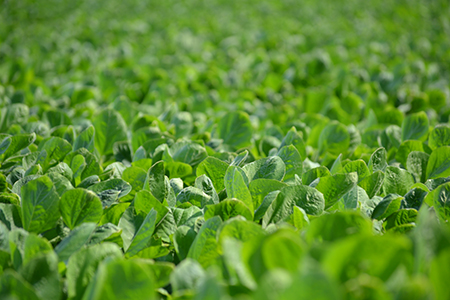
Indigo Ag Lands $250M Financing, Expands RTP Facility

Boston-based Indigo Agriculture, which has an expanding facility in Research Triangle Park, has launched an online grain sales platform called MarketPlace that is supported by the closing of a $250 million Series E round of financing.
The new funding, which includes new and existing investors, brings the company’s total financing to more than $650 million.
Marketplace is a digital platform that allows farmers selling grain to interact with buyers. It provides farmers a way to get better prices by differentiating their crops, so buyers can choose those with specific characteristics, such as organic certification, protein content, or milling quality.
The company says that in its first three and a half months prior to its official launch, Marketplace already has seen significant traction, with thousands of growers and buyers on the platform.
Linking growers and buyers
“Directly connecting growers and buyers is a critical step toward a food system that is responsive to the voices of consumers," Indigo CEO David Perry said. "As long as farmers are producing a commodity, they have little economic incentive to produce crops of higher quality or produce them more sustainably. Indigo’s Marketplace enables buyers who want differentiated grain to buy it directly from the growers who produce it, and reduces the supply chain costs for the whole industry.”
The company, founded in 2014, spun out of Cambridge, Massachusetts-based Flagship Pioneering, was valued at $1.4 billion when it raised more than $200 million from UK-based Baillie Gifford and Dubai-based Activant Capital in 2017.
Indigo employs more than 350 people, including 15 at its temporary RTP office and lab space on Laboratory Drive. It is working to build out new Indigo RTP labs, approximately 24,000 square feet of greenhouses, labs and offices, which it expects to occupy by November.
RTP workers specializing in battling biotic stresses
“The RTP office is focused on addressing biotic stresses in agriculture, such as pests and disease stress, which affect global growers,” said Allie Evarts, Indigo’s PR spokesperson, in an interview with NCBiotech.
“We aspire to develop bio-fungicides and bio-insecticides using naturally occurring microbes to replace some of the agricultural chemicals used today.”
She added that in addition to supporting its launch of Marketplace, the Series E funding will also support the microbial technology being developed at the RTP operation. “We will continue to hire at the RTP site,” she said.
Perry said that while the company is engaging in additional sectors of the agriculture business, such as the grain sales platform, it retains its focus on microbiology.
Most people know that the microbes in the human gut are important to health, but plant microbes are just as important to crops. Indigo uses plant microbes to increase crop resistance to drought and pests and increase yields significantly.

Indigo is developing microbial seed treatments for corn, cotton, rice, soybeans and wheat. It has identified the microbes that provide resistance to drought or the need for fertilizer and coats seeds with them prior to planting.
The company says it has “the world’s largest agriculture lab” via Indigo Research Partners, a network of more than 50 of the largest U.S. growers launched in 2017. The company uses a combination of data analysis from sensors, drones, weather stations and other technologies, drawn from more than 25,000 acres of crops, to apply its technologies to specific field conditions.
“Traditional agriculture has never had access to this level of information,” said Jeremy Jack, of Silent Shade Planting Company, a Mississippi Delta-based advisory board member and an Indigo Research Partner.
Indigo looks at normal fields in dry conditions to examine which plants stay healthiest. It “fingerprints” those plants’ microbiomes with genetic sequencing of thousands of samples. After establishing which microbes are in the healthier plants, they go to large field trials.
Initially, the company has focused on improving plant yields in drought conditions. Its microbial coatings kicked up yields significantly in cotton and wheat in Texas and Kansas trials.
Research approach relies on big data, new tech
Indigo Research Partners, the company says, enables an entirely new method of agricultural R&D by eliminating the “one size fits all” approach associated with traditional field trials. The platform is designed to generate data relevant to a specific farm or field and lead to actionable insights for growers. The breadth and depth of the platform prepares growers to manage any number of environmental and field conditions, from cold and wet stress to heat and water scarcity.
The partnership program grants the growers equity in Indigo.
The company is dedicated to sustainable agriculture, environmentally friendly technology, and hopes to see crop yields increase as much as 50 percent eventually, according to Perry. It demonstrated average wheat gains of 19 percent under low-yielding conditions and 13 percent across all conditions from its most recent trials of Indigo wheat on 24 fields across Texas, Oklahoma, and Kansas.
The company says one Oklahoma grower was the envy of his farmer neighbors when he brought in decent crops under drought conditions while others suffered.
Perry, a serial entrepreneur who sold two startups, including one bought by Pfizer for $5.2 billion, joined the company in 2015 when it had 14 employees.
Reared on a small farm in Arkansas, Perry has a broad vision for Indigo that includes sustainability, transparency, and innovation. He realized farmers needed buyers willing to pay a premium price for non-GMO, pesticide-free products, and instituted a program that allows Indigo to contract with farmers to buy their entire harvests of Indigo wheat at a premium.
Making a shift toward value-added food products
This, Perry has said in interviews, is a shift toward “value-added” food products, transparency, and specialty markets, all encouraging profitable and sustainable food agriculture practices.
In his talk to the World Economic Forum annual meeting in January, 2018, Perry said seed treatments derived from plant microbes have demonstrated the ability to increase yields under stressful growing conditions, “While in ways acting like their chemical counterparts.”
In time, he said, “Microbial products have the potential to replace the bulk of synthetic fertilizers and chemical insecticides used today.”
He also pointed out the potential of digital technologies to “Revolutionize decision-making both on the farm and by the consumer.”
“Precision agriculture, based around the adoption of software and data tools on the farm,” he said, “has the potential to optimize nearly every decision that a farmer makes. Digital tools can also help connect consumers more meaningfully to farmers, fostering understanding and support for the production methods they use.”
